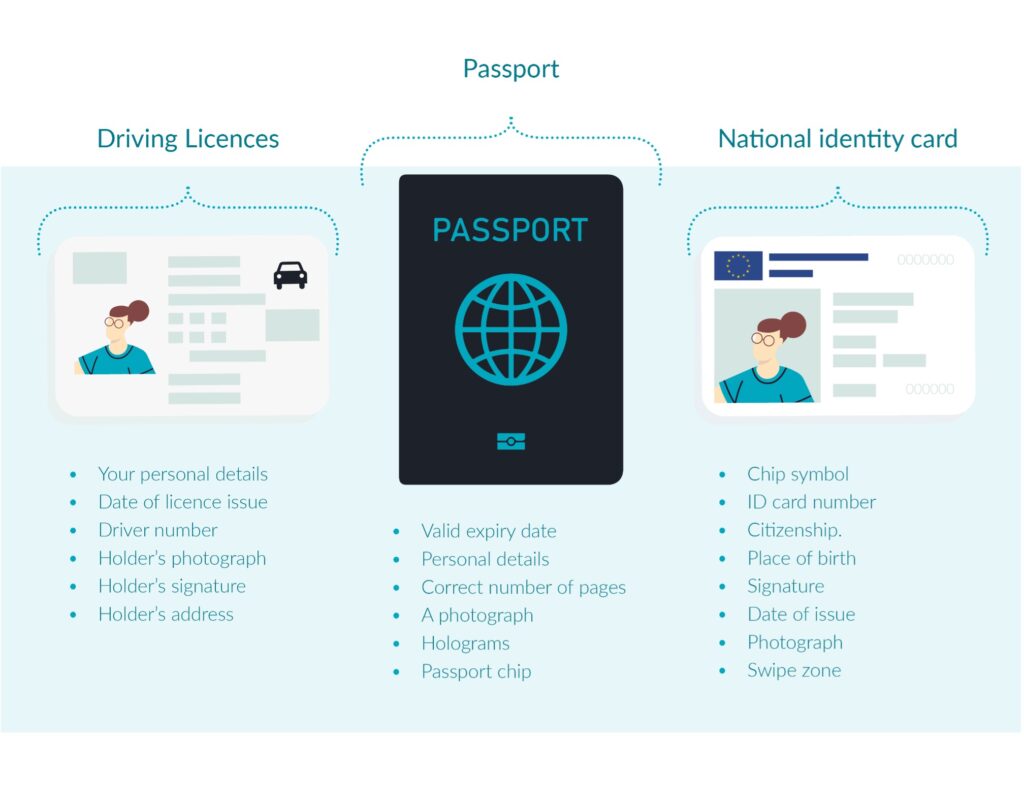In the United Kingdom, some documents are acceptable as proof of identity. These include a valid UK passport, driving license and identity cards. Birth Certificates by themselves are not considered to be evidence of identity. Often easy to get and replicate, they are usually supporting documents to other forms of identification. This article looks at what are acceptable forms of ID in the UK.
To open an account with a bank or financial institution in the UK, you need to provide one of these three ID documents. You will need to show valid documentation and prove your identity, also known as verifying your identity if you wish to seek legal advice or purchase a property. You can read the UK Government proof of identity checklist here.
A passport is a document issued by the UK or EU granting the bearer international travel. A passport will have your full name and a picture. It is also used as proof of citizenship and as a form of identification. A valid passport will contain the following: You can read more about spotting a fake passport here.
Issued to citizens by the governments of all European member states except Denmark, Iceland and Ireland. And can be used as a form of identification. Valid EU identity cards will contain the following:
A full UK or provisional licence is an official document that grants the holder the right to operate a motor vehicle on public roads. A driver's license should show the holder's full address and be unexpired and can be used as a form of identification. A driver's licence will contain the following:

When it comes to verifying the identity of new clients especially, the documentation under review must be valid and up to date. As a business, there will be Know Your Customer (KYC) processes in place for the exact reason they are to identify and validate clients.
Verifying customer identity is the first step; if that client is looking to purchase a property, for example, and is seeking the services of a conveyancer or someone else in the financial sector. Not only will the kya requirements need to be met, but there will also be anti-money laundering (AML) regulations that businesses must follow as a legal requirement.
During this level of enhanced due diligence, a client's source of funds might be required, and all documents and information provided must be up to date, with things such as utility bills or bank statements; these will need to be no older than six months old.
Clients will need to be screened for financial crimes, money laundering and even terrorist financing. If a business doesn't have the correct documentation, it will refuse service, and also, if any financial crime is suspected, clients will need to be reported by law.
For existing clients, usually commercial ones, law firms and other legal sector businesses will often practice ongoing monitoring. This is when the client is constantly re-evaluated, and any changes to their circumstances or publicly available information changes, firms will often react to this and re-assess their business relationship with that client.
You can read more here about the financial action task force (FATF), which develops policies designed to combat money laundering and terrorist financing.
Every business operating within the legal and financial institutions will have AML and KYC requirements and KYC compliance to adhere to by law. The thought of automating these processes must sound daunting at first; however, using digital tools to verify clients' identities is quicker and costs less and safer. We at Validient have built our technology platform around the highest level of due diligence, screening things such as passports and utility bills to identify and verify clients accurately. Want to know more about compliance in business? Click here!
We allow a business to comply with their AML regulations and KYC requirements while improving client experience and speeding up the entire process. We enable firms to select the type of documents they accept for ID, allowing tailored customisation for your business.
We have tools that deliver ongoing monitoring of existing clients, meaning reduced risk and confidence in the people you do business with. We will accurately verify the customer's identity, screening for any PEP or sanctions against them. And for corporate clients, we give you the tools to identify beneficial owners within the ownership structure of a company.
Automation takes long, arduous and complex tasks. It allows you as a business to perform them with ease, delivering results in minutes and allowing you to focus on more pressing matters.
To find out how Validient can change your business and help you understand what are acceptable forms of ID in the UK, book a demo with us here!